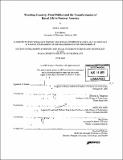| dc.contributor.advisor | Deborah K. Fitzgerald. | en_US |
| dc.contributor.author | Hamilton, Shane, 1976- | en_US |
| dc.contributor.other | Massachusetts Institute of Technology. Program in Science, Technology and Society. | en_US |
| dc.date.accessioned | 2007-10-19T20:27:06Z | |
| dc.date.available | 2007-10-19T20:27:06Z | |
| dc.date.copyright | 2005 | en_US |
| dc.date.issued | 2005 | en_US |
| dc.identifier.uri | http://hdl.handle.net/1721.1/39178 | |
| dc.description | Thesis (Ph. D. in History and Social Study of Science and Technology (HASTS))--Massachusetts Institute of Technology, Program in Science, Technology and Society, 2005. | en_US |
| dc.description | Includes bibliographical references (v. 2, p. 395-423). | en_US |
| dc.description.abstract | Trucking replaced railroads as the primary link between rural producers and urban consumers in the mid-twentieth century. With this technological change came a fundamental transformation of the defining features of rural life after World War II. Trucking helped drive the shift from a New Deal-era political economy-based on centralized political authority, a highly regulated farm and food economy, and collective social values-to a postwar framework of anti-statism, minimal market regulation, and fierce individualism. Trucking and rural truck drivers were at the heart of what I call the "marketing machine," a new kind of food economy that arose after World War II, characterized by decentralized food processors and supermarkets seeking high volume, low prices, and consistent quality to eliminate uncertainties from the food distribution chain. This marketing machine developed as a reaction against the statist food and farm policies of the New Deal. Government agricultural experts-economists, engineers, and policymakers-encouraged the growth of highway transportation in an effort to redefine the "farm problem" as an industrial problem, an issue to be solved by rural food processors and non-unionized "independent" truck drivers rather than price supports or acreage controls. | en_US |
| dc.description.statementofresponsibility | by Shane L. Hamilton. | en_US |
| dc.format.extent | 2 v. (423 p.) | en_US |
| dc.language.iso | eng | en_US |
| dc.publisher | Massachusetts Institute of Technology | en_US |
| dc.rights | M.I.T. theses are protected by copyright. They may be viewed from this source for any purpose, but reproduction or distribution in any format is prohibited without written permission. See provided URL for inquiries about permission. | en_US |
| dc.rights.uri | http://dspace.mit.edu/handle/1721.1/7582 | |
| dc.subject | Program in Science, Technology and Society. | en_US |
| dc.title | Trucking country : food politics and the transformation of rural life in Postwar America | en_US |
| dc.title.alternative | Food politics and the transformation of rural life in Postwar America | en_US |
| dc.type | Thesis | en_US |
| dc.description.degree | Ph.D.in History and Social Study of Science and Technology (HASTS | en_US |
| dc.contributor.department | Massachusetts Institute of Technology. Program in Science, Technology and Society | |
| dc.identifier.oclc | 62716029 | en_US |

